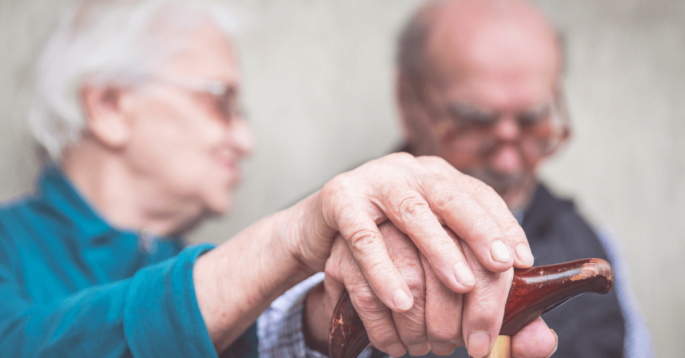After a spike in COVID-19 cases attributed to the Delta variant caused thousands of deaths in nursing homes over the summer, it’s important to focus on how to protect yourself and your loved ones living in long-term care facilities.
COVID-19 poses a higher risk to nursing homes as residents often share living spaces and have pre-existing health problems. Further, lower vaccination rates among staff also put residents at risk.
COVID-19 Delta Variant Kills Thousands of Nursing Home Residents & Staff
The highly contagious Delta variant of COVID-19 overwhelmed nursing homes over the summer of 2021, which led to thousands of deaths among residents.
Appearing in India in late 2020, the Delta variant reached the United States in March of 2021 and has wreaked havoc across the country, particularly in communal settings like long-term care facilities. The Centers for Disease Control and Prevention (CDC) has identified the Delta variant as a particularly dangerous infection because it is twice as contagious as other variants.
A report from the Kaiser Family Foundation (KFF) found that nearly 1,800 nursing home residents and staff died from COVID-19 between the months of July and August alone in 2021.
These deaths are associated with the increased presence of the Delta variant, and they reflect the fact that nursing home residents accounted for roughly one-third of COVID-19 deaths between March 2020 and June 2021.
It’s important to understand that there are ways to protect yourselves and your loved ones in nursing homes from COVID-19, starting with getting a coronavirus vaccination. As a high-risk population, residents of long-term care facilities are best protected through vaccination.
Thankfully, early vaccine efforts allowed most nursing home residents to get vaccinated before the Delta variant reached the U.S., providing them with protection against severe illness and death.
Why Are Nursing Home Residents at Risk of the COVID-19 Delta Variant?
Nursing home residents are at a higher risk of contracting the Delta variant for several reasons. These include the community-style layout of nursing homes, the health of residents, and the number of people vaccinated in the facility. Read more about each below.
Nursing Home Settings & COVID-19
Nursing homes are communal settings, meaning there are living spaces that are shared among many residents like bathrooms, dining rooms, and living rooms.
Since COVID-19 spreads through close contact, those living in nursing homes are especially at risk for contracting the illness because they share these spaces with dozens of other people.
Additionally, residents of long-term care facilities are typically older adults who may have pre-existing health issues. Both factors increase the risk of serious illness or death from COVID-19, leaving nursing home residents particularly vulnerable throughout the pandemic.
Many long-term care facilities took early precautions, like prohibiting visitors and increasing sanitizing protocols, but because of these factors, thousands of residents contracted COVID-19 and died during the pandemic.
Unvaccinated Residents
Roughly 85% of nursing home residents have been vaccinated, but some residents have still chosen not to receive their vaccination. Unvaccinated residents face a much greater risk of contracting COVID-19 and facing serious illness or death if they do.
The CDC has reported that the Delta variant, which now accounts for 99% of all new coronavirus cases in the U.S., may cause more severe illness than other variants of COVID-19 in unvaccinated people.
Unvaccinated Nursing Home Staff
Besides residents, most — but not all — nursing home staff have been vaccinated. By October 2021, about 70% of U.S. nursing home staff were fully vaccinated. Some states have even lower staff vaccination rates, with just 53% of Louisiana nursing home employees fully vaccinated.
Low staff vaccination rates increase the risk posed to residents, as unvaccinated staff can contract COVID-19 and spread it between coworkers or pass it on directly to residents whose immune systems may be weakened.
This can create a dangerous dynamic within long-term care facilities: residents may fall ill and nursing homes may suffer from understaffing when employees are out sick with coronavirus.
COVID-19 Delta Variant May Be Slowing
It’s important to remain vigilant as the pandemic continues, but reports have shown the spread of the Delta variant may be slowing as of mid-October. The numbers of new coronavirus cases are falling, and new developments like the COVID-19 antiviral pill may continue to contribute to the drop in cases, though scientists are still researching that particular medication.
This is good news for those in long-term care facilities who are spending their time around others in their communal living environment. A decrease in COVID-19 cases means less danger for those living in a nursing home, particularly for unvaccinated residents.
It’s still important to understand that the pandemic is not over, though, so residents and staff must continue taking the proper safety precautions to slow the spread of COVID-19 through nursing homes.
The COVID-19 Pandemic & the Future of Nursing Homes
While the recent decrease in COVID-19 cases shows promise, nursing home residents could still face severe illness or death if they contract coronavirus.
To reduce the spread of COVID-19 in nursing homes:
- Avoid crowded areas or places where people are gathering unmasked (as these high-transmission areas increase the risks of getting COVID-19)
- Get vaccinated
- Practice social distancing
- Wear a mask
Another step to take towards protecting those in nursing homes is to research the vaccination rates at the facility where you or your loved one is located. It may be in your best interest to relocate to a different facility if your current nursing home has low staff vaccination rates.
You can research staff vaccination rates by using the care compare tool created by the U.S. Centers for Medicare and Medicaid Services. You can also use this tool to look for possible cases of nursing home abuse or neglect in local facilities.
The Nursing Home Abuse Center team sends its condolences to all who lost loved ones due to COVID-19. Hopefully, with the right precautions in place, the pandemic will be under control sooner rather than later.

